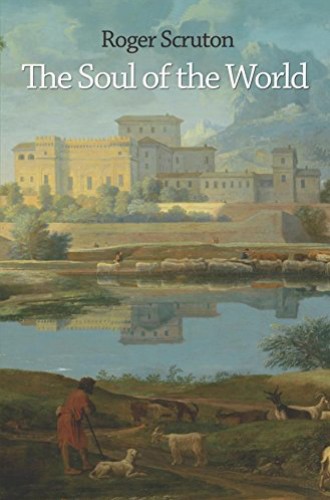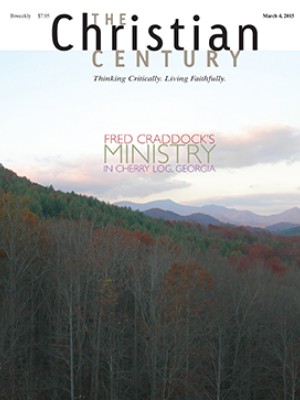The Soul of the World, by Roger Scruton
Philosopher Thomas Nagel has pointed out that a complete scientific description of the world would identify all the objects, forces, and laws of motion but fail to address one important question: Where am I in that world? Roger Scruton cites Nagel with approval, and his point is the basic theme of The Soul of the World: “Science cannot tell who I am, let alone where, when, or how.”
The book is based on the Stanton Lectures that Scruton delivered to the faculty of divinity at the University of Cambridge in 2011. The location is worth noting. Cambridge philosophy has been haunted for years by Ludwig Wittgenstein, a specter not uncongenial to Scruton’s own style of philosophy: Scruton’s presentation is marked by allegiance to Wittgenstein’s espousal of “ordinary language.” Because lectures on divinity easily fall into insoluble profundities, this ordinary-language take on traditional issues is refreshing.
Read our latest issue or browse back issues.
Nagel considers the question of how we use the words I and you. I address you, I implore you, I promise you: these are basic moves in any dialogue of moral responsibility. In the language of science, addressing, imploring, and promising are nonstarters. But I-you moral dialogue is not rooted in science.
In his initial chapters Scruton considers several sophisticated arguments that seek to undermine the integrity of moral discourse. Critics want to dismiss morality as the outcome of natural causes. Darwinists hold that supposed moral altruism is a genetic strategy for the preservation of the species. Modern brain science claims to locate morality in synapses related to pleasure and disgust. Scruton rejects all such arguments as examples of what Mary Midgley calls the fallacy of “nothing buttery”: altruism is nothing but a ploy for survival of the species; moral discourse tells about nothing but my brain. Scruton contends that not only is moral discourse more than a natural reaction, language cannot be causally explained because it has intentionality. It is about something.
In the moral arena, Scruton cites with mixed appreciation Freud’s view of the incest taboo. Evolutionary explanations of taboo relate to an intense desire not to do something, but the incest taboo arises from a primal disgust, like aversion to certain smells. For Freud, incest is taboo because we have an intense desire to engage in it; however, the taboo forbids it. Taboo is thus a negative moral injunction against a particular type of conduct for which we have a natural desire.
Morality asks for reasons, not causal explanations. The moral inquiry, “Why did you do that?” requires me to give some reason for my action. When you ask me for a reason, you probably want to understand my action, not to hear me explain it. “I felt like doing it” may explain my action, but it does not make my action reasonable. Reasons are more than reminders about how one happens to feel.
The dialogue of I and you creates the world of morality, beauty, and religion—a world in which humans are active participants, not merely scientific spectators. Scruton’s position is dualistic, resting on a sharp distinction between the world of scientific explanation and the Lebenswelt—or life world—of human reasons and understanding. Having affirmed dualism, Scruton is at pains to note that this is a cognitive, not an ontological, dualism. The human soul and the “soul of the world” are not separate entities—the human soul as some “ghost in the machine” or God as a supernatural cause. Supernatural cause is a contradiction, Scruton argues; a cause is a natural event by definition. God arises in the Lebenswelt.
Scruton goes on to examine how the distinctly human world reveals itself in the human face, in sexuality, and in architecture, music, and religion. In a chapter titled “Facing Each Other” he elaborates on our perception of soul. “When I confront Mary face-to-face, I am not confronting a physical part of her. . . . I am confronting her, the individual center of consciousness.” Regarding the other as soul, as an embodied subject, is “a well founded phenomenon,” he writes. On the other hand, failure to see the other as soul distorts sexuality to “the pursuit of pleasure in the private parts.” The fact that much pop culture accepts sex as nothing but pleasuring is an example of what Scruton nicely labels “the charm of disenchantment”—the urge to be “realistic” that leads one to shoddy thought and equally shoddy behavior.
In The Soul of the World, Scruton recapitulates views on the human meaning of our built environment that he expressed some 35 years ago in The Aesthetics of Architecture. He extols the traditional “orders” of column, lintel, and arch that once gave a human scale to architecture, contrasting that classical style with the glass facades of contemporary office towers. The glass tower is faceless, glazed. It has no base or capital, moldings, or ornaments. “It escapes upward as though fleeing. . . . It concludes in nothing.” The glass tower is not a place of human habitation, so the workers flee their functional cubicles for an ever-expanding exurbia. In contrast, a truly human city is founded on and centered in the temple, a place where the people’s gods abide, thereby granting authority to settle rather than wander in the desert—or in the decentered world of global commerce.
In the penultimate chapter, “The Sacred Space of Music,” Scruton says, with Rilke, that music is a “godly home.” Why? John Scotus Eriugena wrote (as Scruton appreciatively quotes): “We do not know what God is. God himself does not know what He is because He is not anything. Literally, God is not, for He transcends being.” How can something that is not, and is beyond anything we can know, be real for us? Scruton suggests that music is just such a reality. “Music is a movement of nothing in a space that is nowhere, with a purpose that is no one’s, in which we hear a nonexistent feeling the object of which is nobody.” If we apply “nothing buttery” to music, it would be nothing but one sound after another. But “musical culture . . . requires us to respond to a subjectivity that lies beyond the world of objects, in a space of its own. . . . Music addresses us from beyond the borders of the natural world.”
In the final chapter Scruton asks the ultimate question: “Is the sacred merely a human invention, or does it come to us also from God?” Surprisingly, Scruton turns to Jean-Paul Sartre, whose Being and Nothingness he describes—correctly, to my mind—as “a great work of post-Christian theology.” It may be the case that music transports us to another world, but real life ends in death and nothingness. In Sartre’s novel Nausea, a character claims that Chopin had been a great consolation after the death of her husband. The Sartrean narrator comments, “What fools human beings are.” Music is no consolation for the nothingness of death. Religion also attempts that consolation. Does it suffice? Scruton offers no easy answer; he quotes Phillip Larkin, who writes that religion is “that vast, moth-eaten, musical brocade / Created to pretend we never die.”
Scruton interprets Sartre’s stark vision that we come from nothing and go back to nothing as a doctrine of creation. As I-you we are created, unique beings that cannot be explained as instances of the species. The self is a creation ex nihilo. For Sartre our radical uniqueness rounded by nothingness is just a given; it is absurd. But we may also regard the given as a gift. Even an atheistic Sartre might regard personal life as a gift within which we advance the human project. In any version of life as gift, we bear the responsibility to honor that gift; wasting it is sin.
In an interpretation of Abraham’s willingness to sacrifice the gift of Isaac, and of the cross as God’s gift of Godself to humanity, Scruton offers a final account of faith and religion—not, in his mind, the same entity! His answer to Larkin: “The idea of salvation . . . in no way requires eternal life. . . . It does require an acceptance of death, and in the sense that in death we are meeting our creator, . . . to whom we must account for our faults. We are returning to the place from which we emerged and hoping to be welcomed there.”
The Soul of the World is a short book that contains many insights about classic religious concerns. Clearly written and carefully argued, the text is rich and subtle, well worth reading and rereading.






